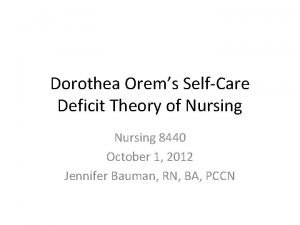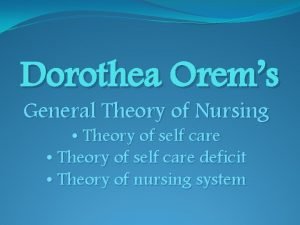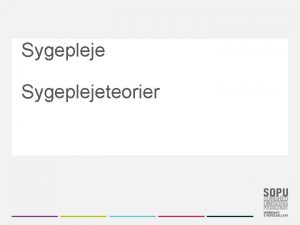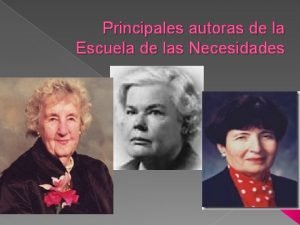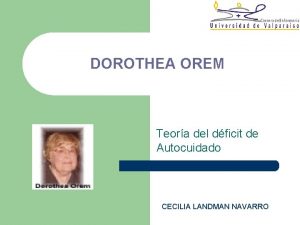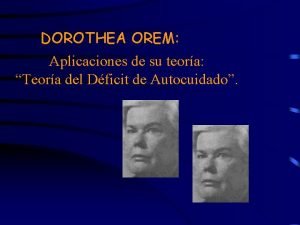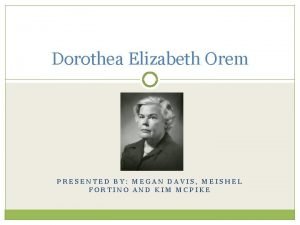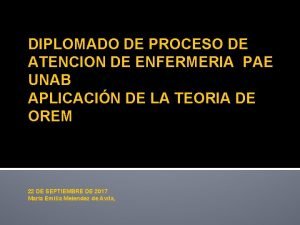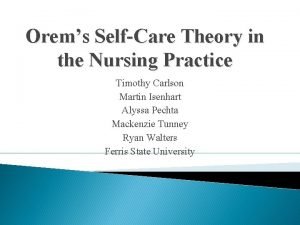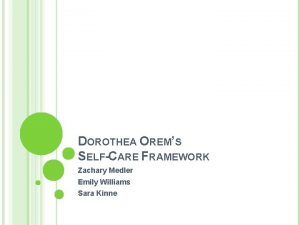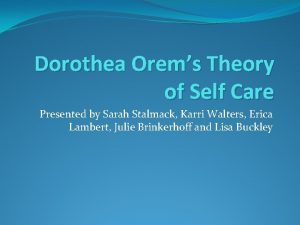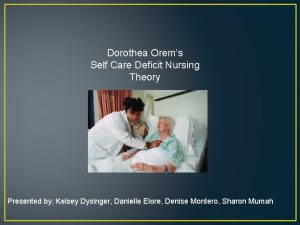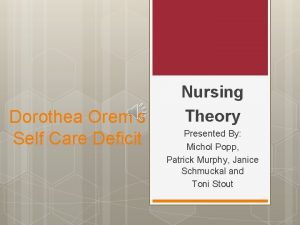DOROTHEA OREM Shumetria Cleveland Tara Zander Introduction Orems















- Slides: 15

DOROTHEA OREM Shumetria Cleveland Tara Zander

Introduction Orem’s Self-Care Theory Improve the quality of nursing and the foundation in order to better teach self care to both independent and dependent patients and families.

Philosophy � Standard for Nursing Knowledgeable in self-care Therapeutic in approach � Patient Self-Care Standard Independent Desire to do self-care Ability to do self-care Dependent Desire to do self-care Ability to learn self-care

Origin Dorothea Orem Started nursing in 1939 1945 Master Degree Catholic University of America Concepts 1 st Published in 1959 Orem continue to improve and evolved theory Published Nursing: Concepts of Practice in 1971 Sixth edition published in 2001

Background � Orem’s Orem Self Care Model developed three interrelated theories Theory of Self Care Theory of Self-care Deficit Theory of Nursing System � Orem uses the nursing process to determine self care deficits. Assessment Care plan Implementation Evaluation

Theory of Self Care Focuses on the patients ability to provide basic care for self How does the patient care for themselves as a human being Is their environment appropriate for their health conditions What nursing resources does the patient have to assist them Patient is able to ADL’s to maintain a healthy life and well-being

Theory of Self Care Deficit � Limitations in effective self care due to illness, injury or disease. � Nursing intervention is needed.

Theory of Nursing In patients with self care deficit: nursing interventions will be followed to promote self care needs.

Global Concepts Human and Environmental Meet condition for self-care Meets developmental needs Understand consider environmental factors that hinder patient self-care Health and Nursing Maintains integrity Exceeds capabilities Design a plan Implement the plan Follow the plan

Evaluation of nursing model Philosophy of self-care is unique to nursing Focus on Global Concepts Model usage in OB and OR Concept is specific Concept has lead to other theories Model is used in: � Nursing schools � Hospitals

Resources Editor. (2012). Low status, dirty work', in whose opinion? Current Nursing. Retrieve from http: //currentnursing. com/nursing_theory/self_care_def icit_theory. html

Case Study: John, 32 year old male Presented in emergency department with rapid respirations and pale skin. Oxygen via nasal cannula at 2 liters and IV infusion of 0. 9% sodium chloride via 20 gauge peripheral venous access device was started. Vital signs were 98. 6 F (37 C) orally; heart rate 126, respirations 24, and blood pressure 99/70 lying and 78/60 sitting, skin turgor is poor. Paramedics who transported him to the emergency department stated that his finger stick blood glucose level was 400 mg/dl in route. John stated that he was playing football and began to feel sick. One hour later at home he began vomiting and felt confused, so his girlfriend called 911. The girlfriend said that recently John had been experiencing increased hunger, weight loss, frequent urination and fatigue. Based on John’s clinical status and history he was diagnosed with acute hyperglycemia and diabetic ketoacidosis (DKA) cause by undiagnosed type I diabetes. John was admitted to the medical surgical unit.

What self-care measures does the nurse need to teach?

Answer: The nurse should provide the patient with information about insulin, how to use a glucometer, how to give injection based on a sliding scale, the sign and symptoms of hyper and hypoglycemia. The nurse should have the patient to draw up his insulin and give himself the injection. The patient should also be taught the safe place to give subcutaneous injections and to remember to rotate the injections. Inform the patient that he needs regular evaluations by an endocrinologist, ophthalmologist and primary care provider for diabetes complications. It is important for the patient to have his HBG A 1 c check quarterly and inform the patient to consider wearing a medical alert bracelet. Consult the nutritionist to see the patient for new onset of diabetes. On discharge refer the patient to the diabetes clinic for additional teaching.

References Taber’s Cyclopedia Medical Dictionary, 21 st edition, Dorothea Orem’s Self. Care Framework, Orem, D. E, Taylor, S. G. , (2011) Reflection on Nursing Practice Science: The Nature, the Structure and the Foundation of Nursing Sciences, Nursing Science Quarterly, http: //nsq. sagepub. com/content/24/1/35 Doi: 10. 1177/0894318410389061 Chitty, K. K & Black, B. P. (2011), Professional nursing: Concepts and Challenges (6 th ed. ) Maryland Heights, MO: Saunders
 Dorothea orem background
Dorothea orem background Dorothea orem
Dorothea orem 14 behovsområder
14 behovsområder Dorothea orems theory
Dorothea orems theory Tanja zseby
Tanja zseby Necesidades de virginia henderson
Necesidades de virginia henderson Necesidades de dorothea orem
Necesidades de dorothea orem Dorothea orem teoria
Dorothea orem teoria Modelo de autocuidado de dorothea orem
Modelo de autocuidado de dorothea orem Dorothea elisabeth orem
Dorothea elisabeth orem Teoria de orem
Teoria de orem Foto dorothea orem
Foto dorothea orem Dorothea orem quotes
Dorothea orem quotes Dorotea orem
Dorotea orem Dorothea orem metaparadigm
Dorothea orem metaparadigm Definicija zdravstvene njege po virginiji henderson
Definicija zdravstvene njege po virginiji henderson
